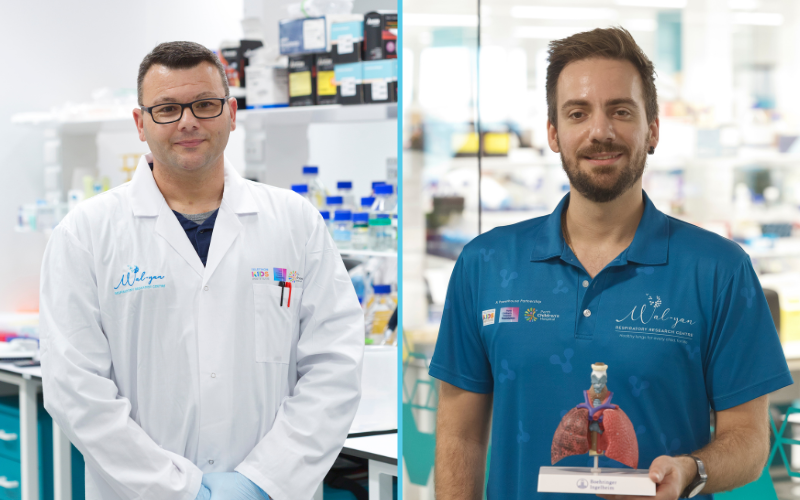
New funding from the Stan Perron Charitable Foundation will support research into innovative treatments for antibiotic-resistant infections and asthma in children, led by Wal-yan Respiratory Research Centre researchers.
Associate Professor Anthony Kicic has been awarded a Programs and Partnerships grant to establish a novel therapeutics pipeline to treat antibiotic resistant infections in children.
Dr Thomas Iosifidis has been awarded a People grant to support his work for a further five years into enhancing airway repair to prevent respiratory deterioration in children with asthma.
Establishing a novel therapeutics pipeline to treat antibiotic resistant infections in children
Led by Associate Professor Kicic, the focus of this program, already underway, is on introducing a bacteriophage therapy program in Western Australia, offering a swift and effective solution for individuals battling antimicrobial resistance (AMR) bacteria.
AMR occurs when bacteria develop ways to defend against conventional medicines, posing a growing global threat. The World Health Organization projects that, by 2050, AMR could claim the lives of over 10 million people annually.
Termed 'superbugs,' these resilient bacteria not only jeopardise lives but also significantly increase the healthcare burden, leading to prolonged hospital stays, heightened intensive care needs, elevated risk of complications, and frequent hospital re-admissions.
Children bear the brunt of this resistance, receiving antibiotics more frequently than any other medication type. Those with underlying conditions like cystic fibrosis face a heightened risk of developing AMR.
As the pace of antimicrobial drug discovery has slowed, the need for alternative therapeutic strategies becomes more urgent. Enter bacteriophages, or 'phages' — naturally occurring viruses proven to be safe and effective in combatting AMR infections.
This program strives to be at the forefront of developing a pragmatic treatment approach for targeted bacteria, marking a significant step from research to therapy.
Enhancing airway repair to prevent respiratory deterioration in children with asthma
Dr Iosifidis’ research aims to find novel ways of treating the underlying damage to the cells in people with asthma.
Asthma remains a substantial global health care burden with around 330 million sufferers worldwide. In early life, wheeze and asthma are the most common chronic respiratory disorders in children and remain one of the main causes of their hospitalisation.
A chronic problem that occurs in kids with asthma is the irreparable damage to the cells lining the airways. Over time, these cells become less effective at repairing themselves, leading to inflammation and in turn difficulty breathing.
Dr Thomas Iosifidis’ team is developing new medicines for asthma in a new therapeutic area – targeting the repair of damaged airway cells, which current medications fail to target.
Unlike current treatments, early intervention with these therapeutics in young children is expected to reduce the chronic burden of asthma by limiting, or even halting, persistence of asthma into adulthood.
The Stan Perron Charitable Foundation has a long tradition of funding Western Australian research that aims to solve problems and deliver tangible outcomes that will benefit children, adolescents or young people.
You can read more about other The Kids Research Institute Australia grant recipients here
The Wal-yan Respiratory Research Centre is a powerhouse partnership between The Kids Research Institute Australia, Perth Children’s Hospital Foundation and Perth Children’s Hospital.
